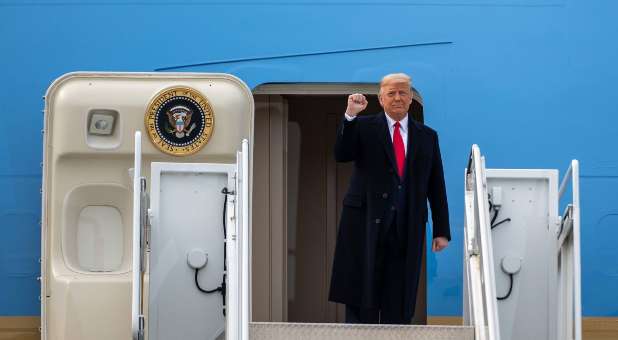Stephen Strang: Why Trump’s ‘Nondenominational’ Label Doesn’t Surprise Me
When Donald Trump told Religion News Service he now considers himself a nondenominational Christian, even though he was confirmed a Presbyterian as a boy and was once a member of Norman Vincent Peale’s Marble Collegiate Church in New York City, the news did not surprise me.
That’s because I’ve followed Trump’s spiritual odyssey since I interviewed him about it in 2016. I’ve since written four books about the president, three of which have “God” in the title—the most recent being God, Trump and COVID-19.
In God and Donald Trump I researched his Presbyterian roots going back to Scotland where his mother was born and how she raised her family in America as devout Presbyterians. As a boy, Trump apparently took his confirmation seriously, based on how he likes to talk about it and show a picture of himself with the other children confirmed with him. In fact, he chose the Bible his mother gave him at that time to use at his swearing-in ceremony as 45th President of the United States.
In God, Trump and the 2020 Election, I dealt with “where is God in all of this?” I explored how could He use such a flawed man as Trump and how this New York ladies man became a champion of religious freedom, constitutional rights and other causes near and dear to conservative Christians such as pro-life and pro-Israel. I document how he seemed to get more serious about life and began watching Christian television programs such as Jim Bakker, Paula White and Ken and Gloria Copeland in the early 2000s. Each of those hosts has said the president told them he’d watched their programs for years.
All these ministries consider themselves nondenominational. Indeed, that’s the trend I’ve been covering in Charisma magazine for the past 40 years. Most growing churches are often started by eager young pastors focused on winning their communities to Christ. They set up a nondenominational church rather than go through a denomination that may be liberal or, at the very least, is stifling. Even denominational churches such as Rick Warren’s Saddleback Church don’t use a denominational name and appear to be nondenominational.
Trump once attended a David Jeremiah conference and told him he watched his program. He also speaks fondly of his relationship with Norman Vincent Peale, and Trump’s brand of Christianity seems upbeat like Peale’s—think positively and you’ll have a winning life.
But the most current influence in his spiritual life has been Paula White Cain, whom he called after first watching her TV program on a tiny Christian channel based near Mar-a-lago. He told her she had the “it” factor and had some questions for her. A friendship ensued, and over the years, this pastor from Apopka, Florida, became his “spiritual adviser.” I interviewed her, and she says she’s been careful never to ask or accept money for her ministry from Trump, but only to pray and be available to him.
In one of our interviews White Cain explained that with the security and confusion Trump’s attendance brings to a church, he rarely attends. At Easter he often visits an Episcopal church, The Church of Bethesda-by-the-Sea in Palm Beach, Florida. But he talks to his evangelical advisers and invites them to pray for him.
When Trump was thinking of entering the 2012 presidential race, he said he wanted a group of pastors, not to endorse him but to pray about his decision. Around 2011, White Cain called some of her pastor friends—most of them also nondenominational—and they prayed, according to Kenneth Copeland, for six hours and told Trump the time wasn’t right for him to run. When he did run in 2016 they became a part of the president’s evangelical advisory committee, and others such as Dr. James Dobson and James Robison were added.
The Religion News Service, which in my opinion has a politically correct view of what it means to be religious in America, posed questions about why other “faith groups” weren’t included. Well, Trump has never been interested in satisfying the politically correct view. His faith advisers are loyal to him, and many have become friends, so he’s satisfied with that.
Besides, whatever Trump did would be criticized. If he walked on the Potomac River, some of the media would no doubt attack him for not being able to swim.
The president has always been quiet about his faith. And why not? Faith is about a personal relationship with God, not for public consumption. But I know pastors who say they have prayed with the president to accept Christ.
But as Pastor Robert Jeffress of First Baptist Church Dallas said: “Look, I might not choose this man to be a Sunday school teacher in my church, but that’s not what this election is about. It’s about choosing the best leader to reverse the downward spiral of the nation,” according to reporting in 2016 from The Daily Beast.
As a Christian, I’m glad. I think that’s how it should be, not about what denomination he belongs to or if the religious elites approve. {eoa}
















































